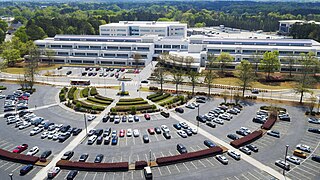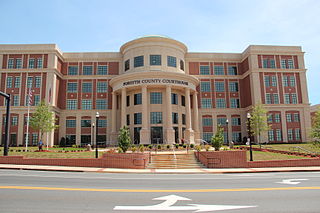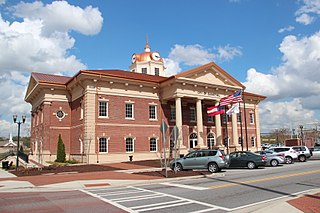Related Research Articles

Hall County is a county in the Northeast region of the U.S. state of Georgia. As of the 2020 census, the population was 203,136, up from 179,684 at the 2010 census. The county seat is Gainesville. The entirety of Hall County comprises the Gainesville, Georgia, Metropolitan Statistical Area, which is also part of the Atlanta-Athens-Clarke County-Sandy Springs, Combined Statistical Area.

Gwinnett County is located in the north central portion of the U.S. state of Georgia. It forms part of the Atlanta metropolitan area, being located about 9 miles (14 km) northeast of Atlanta city limits. In 2020, the population was 957,062, making it the second-most populous county in Georgia. Its county seat is Lawrenceville. The county is named for Button Gwinnett, one of the signatories of the Declaration of Independence.

Forsyth County is a county in the Northeast region of the U.S. state of Georgia. Suburban and exurban in character, Forsyth County lies within the Atlanta metropolitan area. The county's only incorporated city and county seat is Cumming. At the 2020 census, the population was 251,283. Forsyth was the fastest-growing county in Georgia and the 15th fastest-growing county in the United States between 2010 and 2019. Forsyth County's rapid population growth can be attributed to its proximity to high-income employment opportunities in nearby Alpharetta and northern Fulton County, its equidistant location between the big-city amenities of bustling Atlanta and the recreation offerings of the scenic Blue Ridge Mountains, its plentiful supply of large, relatively affordable new-construction homes, and its highly ranked public school system. The influx of high-income professionals and their families has increased the county's median annual household income dramatically in recent years; at $104,687, Forsyth County was the wealthiest in Georgia and the 19th-wealthiest in the United States as of 2018 estimates.

Buford is a city in Gwinnett and Hall counties in the U.S. state of Georgia. As of the 2020 census, the city had a population of 17,144. Most of the city is in Gwinnett County, which is part of the Atlanta-Sandy Springs-Marietta Metropolitan Statistical Area. The northern sliver of the city is in Hall County, which comprises the Gainesville, Georgia Metropolitan Statistical Area and is part of the larger Atlanta-Athens-Clarke-Sandy Springs Combined Statistical Area.

Dacula is a city in Gwinnett County, Georgia, United States, located approximately 37 miles (60 km) northeast of Atlanta. The population as of the 2010 census was 4,442, and the U.S. Census Bureau estimated the population to be 6,255 as of 2018. In 2020, its population was 6,882. The Dacula area is home to some of the oldest buildings in northeast Georgia, such as the Elisha Winn House, which originally acted as the courthouse for Gwinnett County.

Lawrenceville is a city in and the county seat of Gwinnett County, Georgia, United States. It is a suburb of Atlanta, located approximately 30 miles (50 km) northeast of downtown. It was incorporated on December 15, 1821. As of the 2020 census, the population of Lawrenceville was 30,629.

Lilburn is a city in Gwinnett County, Georgia, United States. The population was 14,502 at the 2020 census. The estimated population was 12,810 in 2019. It is a part of the Atlanta metropolitan area.

Sugar Hill is a city in northern Gwinnett County in the U.S. state of Georgia, included within the Metro Atlanta area. The population was 25,076 as of the 2020 census, making it the fourth-largest city in Gwinnett County. It is in close proximity to Lake Lanier and the foothills of the North Georgia mountains.

Suwanee is a city in Gwinnett County and a part of the Atlanta metropolitan area in the U.S. state of Georgia. As of the 2010 census, the population was 15,355; this had grown to an estimated 20,907 as of 2019. In 2020, its population was 20,786.

The Chattahoochee River is a river in the Southeastern United States. It forms the southern half of the Alabama and Georgia border, as well as a portion of the Florida and Georgia border. It is a tributary of the Apalachicola River, a relatively short river formed by the confluence of the Chattahoochee and Flint rivers and emptying from Florida into Apalachicola Bay in the Gulf of Mexico. The Chattahoochee River is about 430 miles (690 km) long. The Chattahoochee, Flint, and Apalachicola rivers together make up the Apalachicola–Chattahoochee–Flint River Basin. The Chattahoochee makes up the largest part of the ACF's drainage basin.

The Gwinnett County Public Library is located in unincorporated Gwinnett County, Georgia, United States, northeast of Atlanta. The library currently has 15 branches throughout the county and employs an interlibrary loan system for those with a valid library card.

Lake Lanier is a reservoir in the northern portion of the U.S. state of Georgia. It was created by the completion of Buford Dam on the Chattahoochee River in 1956, and is also fed by the waters of the Chestatee River. The lake encompasses 38,000 acres (15,000 ha) or 59 sq mi (150 km2) of water, and 692 mi (1,114 km) of shoreline at normal level, a "full pool" of 1,071 ft (326 m) above mean sea level and the exact shoreline varies by resolution according to the coastline paradox. Named for Confederate veteran and poet Sidney Lanier, it was built and is operated by the U.S. Army Corps of Engineers for flood control and water supplies. Its construction destroyed more than 50,000 acres (20,000 ha) of farmland and displaced more than 250 families, 15 businesses, and relocated 20 cemeteries along with their remains in the process.
The Gwinnett County Public Schools is a school district operating in Gwinnett County, Georgia, United States. GCPS is the largest school system in Georgia, with over 140 school buildings and an estimated enrollment of over 182,000 students for the 2023–2024 school year. GCPS is estimated to be the 14th largest school district in the U.S. The district has its headquarters near Suwanee.
Georgia's 9th congressional district is a congressional district in the north of the U.S. state of Georgia. The district is represented by Republican Andrew Clyde, who succeeded fellow Republican Doug Collins. The district is mostly rural and exurban in character, though it stretches into Hall and Gwinnett counties on Atlanta's northern fringe.
Georgia's 7th congressional district is a congressional district in the U.S. state of Georgia. It is currently represented by Democrat Lucy McBath.

Metro Atlanta, designated by the United States Office of Management and Budget as the Atlanta–Sandy Springs–Roswell metropolitan statistical area, is the most populous metropolitan statistical area in the U.S. state of Georgia and the sixth-largest in the United States, based on the July 1, 2023 metropolitan area population estimates from the U.S. Census Bureau. Its economic, cultural, and demographic center is Atlanta, and its total population was 6,307,261 in the 2023 estimate from the U.S. Census Bureau.

The 1968 United States presidential election in Georgia was held on November 5, 1968. American Independent Party candidate George Wallace received the most votes, and won all twelve of the state's electoral college votes.

The 1972 United States presidential election in Georgia took place on November 7, 1972, as part of the 1972 United States presidential election. Georgia voters chose 12 representatives, or electors, to the Electoral College, who voted for president and vice president.
The Forsyth County Public Library (FCPL) is a consortium of four public libraries in Forsyth County, Georgia, United States. All four branches are located in the county seat of Cumming.
The Hooper-Renwick School is located in Lawrenceville, Georgia, and was Gwinnett County, Georgia's only black public high school in the 1950s to 1960s, until the end of segregated education in the county. Hull Elementary was the county's only Black elementary school during this same time period. The Hooper-Renwick School merged with the Gwinnett County School system in the 1960s and has since served a variety of other purposes within the Gwinnett County Public School System. Plans are currently underway to transition the building into a library and Black history museum.
References
- 1 2 3 LeRoux, Marcia H (March 1968). "The History and Development of the Lanier Lake Regional Library". A Master's Paper Prepared for Librarianship 397, Emory University, Atlanta, GA.: 4-5.
- ↑ Frank K., Gibson (1 May 1963). A Survey of the Government of Gwinnett County, Georgia. University of Georgia. p. 89.
- ↑ Brunsman, Howard G (1952). Census of population, 1950. v.2, Characteristics of the population pt.11 (Georgia). Washington, D.C.: United States Government Printing Office. p. 37.
- ↑ "National Archives at Washington, DC; Washington, D.C.; Seventeenth Census of the United States, 1950; Year: 1950; Census Place: Lawrenceville, Gwinnett, Georgia; Roll: 2839; Page: 10, 16; Enumeration District: 67-11"
- ↑ Flanigan, J C (1959). History of Gwinnett County, Georgia. Vol II. Gwinnett County: Gwinnett Historical Society, Inc. p. 181.
- ↑ "Funeral Notices: Mack Duffie Haygood". Atlanta Constitution. 15 September 1994. Retrieved 10 August 2024.